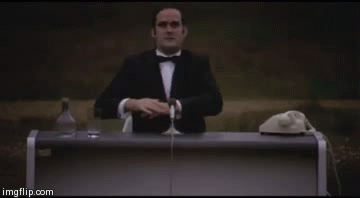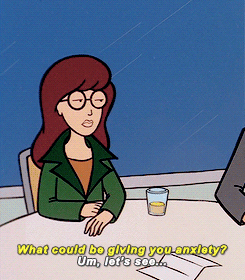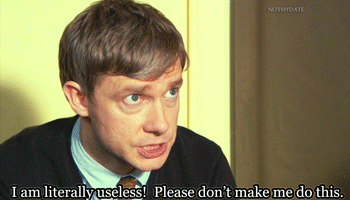Firstly, Happy New Year to all my readers! I hope 2015 brings you all health, wealth, and, of course, published papers!
Secondly, I just wanted to take a moment to thank everyone for all the follows, retweets, posts, emails, messages, and comments. It's been great exercising my editorial muscles over the past year and trying to catalogue some of the knowledge that I've accumulated over the past 7 (yikes! has it been that long?) years. 2015 has some exciting things in store - I officially made the switch to freelance at the end of 2014 so will have more time to devote to blogging (haha) alongside my academic career. So do tell all your friends about me. And keep asking questions!
 |
| reactiongifs.us |
For being such loyal readers, for your belated Christmas gift, I decided to post this and its counterpart
Guest Post: Writing and Writer's Block as a Professor rather than the normal drivel spewing forth from my own keyboard. The two posts are from two ends of the academic spectrum. In the first, theECR comments on getting through the early years of publishing, as well as the lingering fears and anxiety that we all feel. In the second post, LaProfesseur comments on the established years of publishing, as well as the lingering fears and anxiety that we all feel. And thus the idea behind the two guest posts: ECRs are not alone in fears and anxieties. I'm not saying this to scare you into thinking that it'll never go away. Quite the opposite. The intention is to show you that such things are normal and an integral part of an academic career. Learn to deal with them now, and you'll find they'll become much less of an issue.
So without further ado, here is a completely unedited version of theECR's words:
It’s been over three months since I had my first
peer-reviewed article accepted by a top journal in my field and I’m still
pinching myself… and still sort of waiting for them to tell me they’ve made
some terrible mistake. To put the imposter syndrome aside for a moment (don’t
worry, it’s just for a moment…), when theAdmin asked if I’d contribute a post
on the writing process, I agreed immediately. I mean, loads of people blog. How
hard could it be?
Actually, it’s pretty hard.
So here I am, trying to write a post about writing,
writer's block, and my experience, and, guess what? Yep. I have full on
writer's block. You really couldn’t make it up. Underpinning this latest bout
of writer’s block was the gnawing question of ‘what if people think my post is
rubbish’? In fact, substitute ‘post’ for ‘thesis’, ‘chapter’, or ‘article’ and
that pretty much typifies my perception of my academic career to date.
 |
| How I Feel Most Days... Tumblr.com |
It would’ve been so easy to suffer in silence, to walk
even further into what The Thesis Whisperer has called ‘The
Valley of Shit’. I was staring at a blank screen. I was
worried about how the blog post would be received. I was convinced I couldn’t
write anything useful. Worse than that though, I just felt very alone... just
me and this blank screen. All this was uncomfortably familiar. It was exactly
how I felt when writing my first article.
 |
| Yep...my usual response to The Valley of Shit imgur.com |
I knew what I had to do… cue a whiney, late night
conversation to theAdmin. It didn’t take long before I soon realised that
staring at a blank page and all the various neuroses that come with it are
actually totally normal. In fact, they’re fairly typical of the ECR experience.
So, that was a pretty long meandering introduction to
a simple truth: we get stuck all the time and there’s no shame in that. In
fact, part of being an ECR is learning to use our resources and to ensure that
we don’t travel through ‘The Valley of Shit’ on our own. We have guidance and
enthusiasm. We have structure and plans (my PhD work plan is my pride and
joy…). We have serious support networks, which include our supervisors and
mentors, colleagues and friends, and lovely people like theAdmin.
These resources are important. They help you get
started and they can even keep you going. I mean, is there any better feeling
than someone telling you that you’re on the right track, or that your work is
actually good?
 |
| Feels GOOD! imgur.com |
My experience was one of trial and error, just like
yours will be. But let me start at the beginning of the article writing
process. As in all academic disciplines, publishing is paramount. What is it
they say? Publish or perish? Unfortunately, it’s a reality for all researchers
even ECRs. I knew that I needed to have something accepted for publication
otherwise I could kiss goodbye any chance of making it on to a job application
long list…
The idea for my article came from the first chapter of
my thesis. My supervisor thought it was good enough to publish from and
actively encouraged me to turn it into an article. He even suggested a journal
that would be most suitable. His buy in and belief in my work gave me an
initial boost. However, the prospect of transforming an 11,000 word chapter
into a 7,000 word article was tough. What should I cut? Would the journal
actually like it? Was it too theoretical?
After bashing the article into some sort of respectable
first effort, I realised that I needed to call on my support network. I was too
close to this work. It was too precious to me and there was the danger that I
had lost a certain amount of objectivity. Was I killing enough of my darlings? Thankfully,
my supervisor, theAdmin, and another ECR chum were willing to give up their
time to read through my first effort. To be honest, it was pretty nerve
wracking just asking for their feedback, but I knew that I had to get the
article into the best possible shape before I cast it into the depths of the
dreaded peer-review process…
I must’ve printed out the article six times to edit
it, edit it some more, and maybe a little more after that. Throughout that
period, I had convinced myself that this manuscript was going to be instantly
rejected. I soon began to doubt the originality of my approach, the breadth and
depth of my research, and my ability to write coherently and, more importantly,
academically.
 |
| This is not an ideal mindset... tumblr.com |
Needless to say, submitting through the journal portal
(in this case, ScholarOne) was nerve wracking and daunting. I’d followed the
formatting instructions (always remember to do that, otherwise people like
theAdmin get peeved), I’d uploaded the anonymised document, I’d dotted the Is
and crossed the Ts. And I’d seriously run down the battery on theAdmin’s mobile
owing to frantic late night nervous texting.
Why so nervous you might ask? Well, there were many
reasons… I was putting my research out there for the first time in written
form. It was going to be reviewed and critiqued by experts in my field. I was
worried that, if it was rejected, I’d have let down both my supervisor and
myself. Clicking that ‘Submit Manuscript’ button was hard because it was loaded
with so many hang ups and expectations… all of which I’d placed upon myself.
But you know what? The bit that happened after
clicking the button was pretty straightforward and far from the nightmarish
experience I thought it would be. We’re not really taught what to expect with
the whole peer-review journal process. My misguided belief was that two
academics would tear apart my article with glee abandon, laughing their way
through my tenuous arguments and flimsy evidence. We’re led to believe that
it’s an unknown, mysterious abyss from which a polished paper will magically appear.
This is completely false. Contrary to my unfounded, initial expectations, both
the editorial and peer-review process were incredibly helpful. The editors were
extremely approachable and flexible. The comments received from both reviewers
were considered and aimed to strengthen the piece rather than denigrate it. Imagine
my pleasure when one of the reviewers even suggested that my manuscript should
be published in its current form. That felt like a win in its own right, but,
perhaps more importantly, it was a vindication that my work was sufficiently
original and interesting.
 |
| This is what winning feels like.... imgur.com |
Ultimately, my article was accepted with minor
revisions. All in all, it wasn’t the nightmarish process I’d psyched myself up
for. As theAdmin has mentioned countless times, this is a process run by fellow
academics that have probably felt just as nervous, have had writer’s block, and
have worried about clicking that ‘Submit Manuscript’ button just like you.
This is the bit where I try and distill some
insightful words of wisdom to help you with the writing process. Firstly, don’t
be afraid of using your support network… even if it’s just chatting about ideas
over a coffee. Second, remember that the peer reviewers are there to help
strengthen your work. They’re not evil ogres. They’ve more than likely been in
exactly the same position. Third, without wanting to sound all Disney, believe
in your own ability and don’t be scared of writer’s block. It happens to all of
us.
I hope this has been useful. Also, make
sure you keep reading theAdmin's blog! There's got to be some good stuff coming
at some point, right?
-theECR











